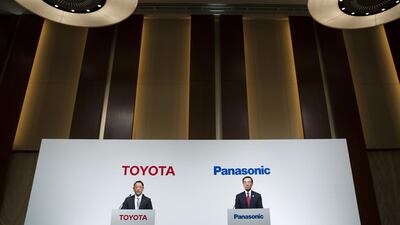Toyota Motor and Panasonic, the world’s largest supplier of electric-car batteries, are exploring a joint business to develop power equipment for zero-emission vehicles as governments and the global automobile industry move to tackle pollution.
The two companies signed an agreement Wednesday aimed at addressing growing demand and expectations for electrified vehicles, the Japanese car maker said. The goal is to make the best prismatic battery - rectangular in shape as opposed to cylindrical - and ultimately contribute to the popularisation of Toyota’s electric cars and those of others, it said.
Toyota has been rushing to develop electric cars amid a boom this year, after initially betting on hydrogen to power the zero-emission vehicles of the future. The company launched a venture with Mazda Motor and affiliate-supplier Denso in September to accelerate development of EV parts for use across a spectrum of models. Toyota plans to introduce electric models by 2020 in China and India, where its partnering with Suzuki Motor.
The Toyota president Akio Toyoda said in September that the company founded by his grandfather 80 years ago has been “a little bit late” in pursuing electric vehicles.
___________
Read more:
Top car makers unite over ethical mineral purchases
Electric car batteries need to be half price to challenge petrol power
___________
While Nissan Motor has sold some 300,000 of the all-electric Leaf since 2010 and Tesla has delivered more than 250,000 EVs since the first Roadster rolled out in 2008, neither Toyota, Mazda nor Suzuki offer battery-powered passenger cars.
Panasonic provides lithium-ion cells for Toyota models including the plug-in Prius. Panasonic and Toyota have also had a joint venture since 1996 called Primearth EV Energy, which makes lithium-ion and nickel-metal hydride batteries for other Toyota cars. Toyota controls 80.5 per cent of the entity, with Panasonic owning the remainder. Panasonic is also the exclusive battery supplier for Tesla’s current production models, and partnered with the Silicon Valley company to build its US$5 billion gigafactory in Nevada.
Bloomberg New Energy Finance sees EV sales surpassing 1 million units this year for the first time, as charging infrastructure becomes more accessible and manufacturers produce models with longer driving ranges. Battery prices have plummeted almost 80 per cent since 2010, and will drop by more than half again by 2026, bringing electric cars to price parity with their gasoline-burning cousins, BNEF predicts.
Separately, Toyota is also pouring resources into the development of a solid-state battery that it aims to have in electric vehicles by the early 2020s. Solid-state batteries promise to offer shorter charging times and longer driving ranges as well as being safer than the current generation of lithium-ion cells.

